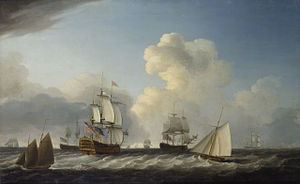HMS St George (1785)

St George and other vessels.
|
|
| History | |
|---|---|
|
|
|
| Name: | HMS St George |
| Ordered: | 16 July 1774 |
| Builder: | Portsmouth |
| Laid down: | August 1774 |
| Launched: | 14 October 1785 |
| Honours and awards: |
|
| Fate: | Wrecked, 1811 |
| General characteristics | |
| Class and type: | Duke-class ship of the line |
| Tons burthen: | 1931 (bm) |
| Length: | 177 ft 6 in (54.1 m) (gundeck) |
| Beam: | 50 ft (15.2 m) |
| Depth of hold: | 21 ft 2 in (6.5 m) |
| Propulsion: | Sails |
| Sail plan: | Full rigged ship |
| Complement: | 850 officers and men |
| Armament: | |
HMS St George was a 98-gun second rate ship of the line of the Royal Navy, launched on 14 October 1785 at Portsmouth. In 1793 she captured one of the richest prizes ever. She then participated in the Naval Battle of Hyères Islands in 1795 and took part in the Battle of Copenhagen in 1801. She was wrecked off Jutland in 1811 with the loss of almost all her crew.
In 1793 Captain John Gell was appointed to be a Rear-Admiral of the Blue and raised his flag on the St George. Whilst in the Mediterranean with his division of the fleet, Gell was able to seize a French privateer and its Spanish-registered prize the St Jago. These ships were said to be one of the most valuable prizes ever brought to England. The ownership of the St Jago was a matter of some debate and was not settled until 4 February 1795, when the value of the cargo was put at £935,000 (equivalent to £87,120,000 in 2015). At this time all the crew, captains, officers and admirals could expect to share in this prize. Admiral Hood's share was £50,000 (equivalent to £4,660,000 in 2015). The ships that conveyed St Jago to Portsmouth were St George, Egmont, Edgar, Ganges and Phaeton.
In October 1793 Gell was able to obtain the surrender of the French frigate Modeste, which had abused the neutrality of the port of Genoa. After this Gell had to return to England for the last time due to ill health.
St George was present at the Naval Battle of Hyères Islands in 1795, and took part in the Battle of Copenhagen in 1801, Flying Nelson's Flag, her captain was Thomas Masterman Hardy, future captain of HMS Victory under Nelson at the Battle of Trafalgar. In 1847 the Admiralty authorized the issuance of the Naval General Service Medal with clasp "Copenhagen 1801" to all remaining survivors of the battle.
...
Wikipedia
